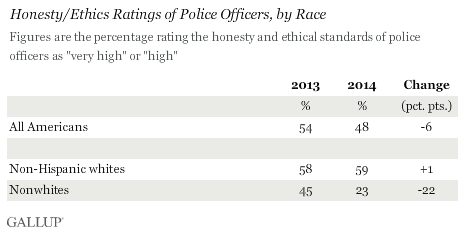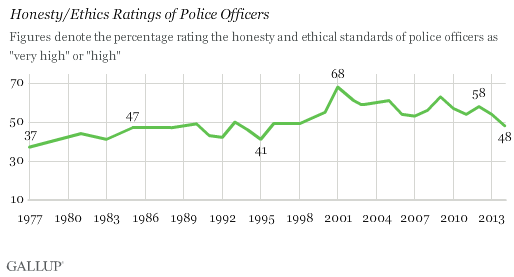Story Highlights
- Americans' honesty/ethics ratings of police are down six points
- Nonwhites show large drop; whites' views are unchanged
- Ratings of police officers lowest since 1995
PRINCETON, N.J. -- A new Gallup poll finds that Americans are less likely now than in 2013 to view police officers as having high honesty and ethical standards after grand juries did not indict white police officers whose actions resulted in the deaths of black men. The overall drop of six percentage points in honesty and ethics ratings is the result of a sharp, 22-point drop in nonwhites' ratings of police officers; whites' views haven't changed.

Earlier this year, a white officer in Ferguson, Missouri, shot and killed an unarmed black teen, and a white officer in Staten Island, New York, held a black man in a chokehold that resulted in his death. Those incidents and, importantly, grand juries' decisions not to indict either officer, have ignited controversy over racial bias and the police's use of force to apprehend suspects.
Although those incidents involved blacks, a single standard poll of U.S. national adults does not usually include a large enough sample of blacks to provide reliable estimates of that specific group's attitudes. However, the Dec. 8-11 poll does include a sufficiently large sample of nonwhites -- consisting mainly of blacks and Hispanics -- to look at differences among this broader racial group.
Even before this year, whites have consistently held more positive views of the police than nonwhites. So the much greater likelihood of whites than nonwhites to view police officers as honest and ethical is not new.
But the data from the Dec. 8-11 poll show that whites and nonwhites are reacting very differently to the recent events -- with nonwhites' already less positive views of police eroding further, while there is little apparent impact on the way whites view the police. Consequently, the gap in white versus nonwhite ratings of the honesty and ethics of police has expanded from 13 points last year (58% to 45%) to 36 points this year (59% to 23%).
Ratings of Police Lowest in Two Decades
The six-point drop in all Americans' ratings of the honesty and ethics of police gives the profession its worst rating since 1995, a time when crime was among Americans' greatest concerns. Still, the current 48% rating of police officers is substantially higher than the all-time low of 37% measured in 1977, the first year Gallup asked the question.

The long-term trend shows two clear phases in Americans' ratings of police officers. From 1977 through 1998, their honesty and ethics scores were consistently 50% or below. From 1999 to 2013, perhaps as a result of sharply declining crime rates, the ratings were consistently above 50%. That includes a record-high 68% in 2001, likely aided by the rally in support for public institutions after the Sept. 11 terrorist attacks.
The recent controversy over the police's use of force has thus eroded much of the increased positivity the police had built up in recent decades.
Implications
Blacks and whites, perhaps because of historical racial discrimination in the U.S. as well as their own life experiences, have largely differing views on matters that touch on race in U.S. society. Ongoing tensions between police and black citizens, commonly in urban areas, also factor into blacks' (and other nonwhites') more negative views of police.
These factors help explain why nonwhites' views of police nosedived after the Ferguson and Staten Island incidents, whereas whites' views have largely held steady. It is certainly possible that as these incidents fade from memory, nonwhites' views of the police -- as well as those of Americans more broadly -- will return to their prior levels. However, improved relations between blacks and police would also go a long way toward improving the way Americans of all racial and ethnic backgrounds view the police.
Survey Methods
Results for this Gallup poll are based on telephone interviews conducted Dec. 8-11, 2014, with a random sample of 805 adults, aged 18 and older, living in all 50 U.S. states and the District of Columbia. For results based on the total sample of national adults, the margin of sampling error is ±4 percentage points at the 95% confidence level.
For results based on the total sample of 606 non-Hispanic whites, the margin of sampling error is ±5 percentage points at the 95% confidence level.
For results based on the total sample of 174 nonwhites, the margin of sampling error is ±9 percentage points at the 95% confidence level.
All reported margins of sampling error include computed design effects for weighting.
Each sample of national adults includes a minimum quota of 50% cellphone respondents and 50% landline respondents, with additional minimum quotas by time zone within region. Landline and cellular telephone numbers are selected using random-digit-dial methods.
Learn more about how Gallup Poll Social Series works.

